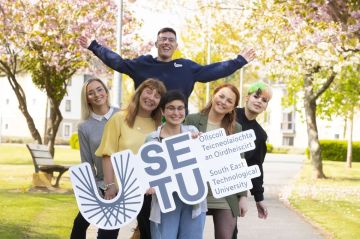Today (1 May) is a day of new beginnings for the south east of Ireland as the regions first university officially comes into existence.
The Minister for Further and Higher Education, Research, Innovation and Science, Simon Harris officially signed the order under the Technological Universities Act 2018 to establish South East Technological University (SETU) on the first day of May.
“This really is a red letter day for the south east. Now for the first time a university stands in the south east. This new university can build on the enormous strengths of both institutes and really put a mark on the quality of higher education, employment, enterprise and skills creation, expanded research, socio-economic and regional development in the vibrant South East. The new university will be building on and with very firm foundations.
“Today would not be happening if it were not for the hard work put in across the past decade by staff, management, students and the people of the south east. While today is the start of a brand new journey, it is only one step on the road. This will be matched by investment, investment in infrastructure and new buildings, investment in education, investment in research.”
The Minister added: “I am delighted also at this time to designate Prof Veronica Campbell as the inaugural president of the new TU serving the south east. Her appointment allied to a very strong governing body with a wealth of experience on all sides, including the former Provost of Trinity who will be well known to Prof Campbell, provides a fantastic platform in my view to take the new TU forward”.
The Chairperson of the Governing Body, Prof Patrick Prendergast said “The creation of South East Technological University is a momentous day for the south east of Ireland. It marks a new dawn for the region, and we in the governing body share an immense pride with the staff and students of SETU in all that has been achieved to make our new university a reality.”
The governing body of SETU met today for the first time and ratified Prof Veronica Campbell as SETU’s first President.
Prof Campbell said “We are ambitious for our new university and for our region. We want to become a leading European technological university, transforming lives, and driving growth through excellence in learning, research, collaboration and innovation. SETU will play a pivotal role in regional development, attracting talent, inward investment and research opportunities to the south east”.
For the first time, the south east now has its own university, allowing students from the region to live at, or near to, home while pursuing an incredible breadth of courses up to doctorate level”.
SETU has evolved out of the institutes of technology at Waterford and Carlow and brings together over 50 years of experience in higher education, research, innovation and stakeholder collaboration.
SETU is a genuinely regional university, with campuses across the south east in Waterford, Carlow, Wexford, Wicklow and Kilkenny. Today SETU serves over 18,000 students and employs over 1,500 staff with ambitions to grow our student numbers to 25,000 with almost 2,000 staff in the next 10 years.
The university’s research performance already shines in Ireland and internationally and provides a strong platform for future development. SETU brings together over 550 research active staff, nine research centres, one research institute and four Technology Gateways across Waterford and Carlow, expanding the range and quality of research to meet the needs of the south east. Over the five years from 2016 to 2020 alone, researchers from SETU have successfully attracted over €95m in research funding from a variety of European and national funding agencies, state bodies and industrial partners.
SETU will officially celebrate its launch in September in a ceremony to mark the university’s first academic year and the first intake of university students presided over by our TU’s first President, Prof Campbell. This will be a celebration to include staff and students, our stakeholders and collaborators, higher education colleagues and all our supporters from across the region and wider networks.


